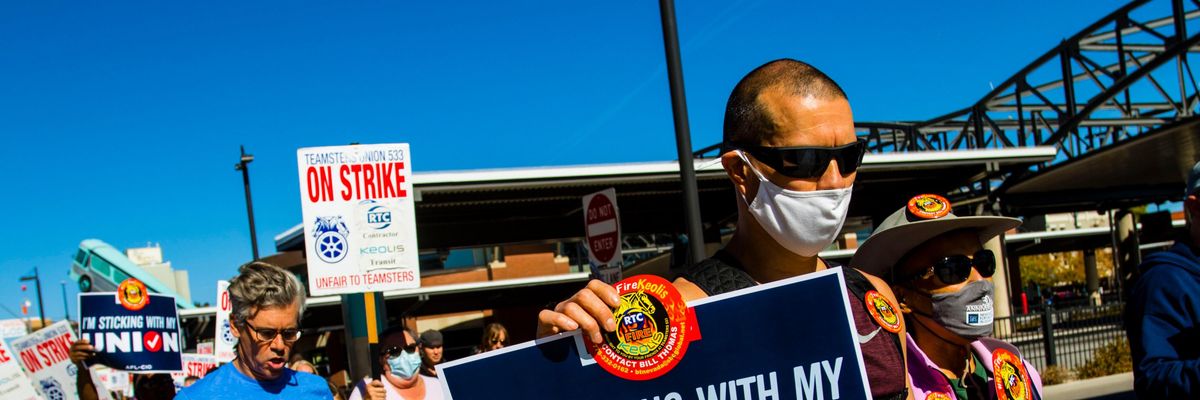
Union members and their allies march in Reno, Nevada on October 16, 2021. (Photo: Ty O'Neil/SOPA Images/LightRocket via Getty Images)
Biden White House Unveils Plan to Bolster Unions as Membership Falls
One critic argued the plan is nowhere near sufficient, warning that "none of the recommendations are substantial enough to move the needle on union density."
The Biden White House on Monday unveiled a report detailing steps that federal agencies can take to strengthen the collective bargaining rights of public- and private-sector U.S. workers as corporate America continues its decades-long, highly effective assault on labor unions.
Compiled by a task force headed by Vice President Kamala Harris and Labor Secretary Marty Walsh, the 45-page report lays out nearly 70 policy recommendations aimed at boosting U.S. union membership, which fell by 241,000 workers in 2021 despite historically high public support for organized labor.
The White House said in a statement Monday that President Joe Biden has accepted the task force's recommendations, which include:
- Increasing unions' access and ability to communicate with employees;
- Launching a government-wide messaging campaign to amplify and publicize Task Force efforts to federal employees;
- Removing unnecessary barriers and obstacles which impede unions from increasing bargaining unit coverage for the more than 300,000 federal workers who are eligible to organize;
- Improving transparency of anti-union campaigns by employers; and
- Make all necessary changes to ensure that workers--alleging retaliation when they are engaged in concerted activity--receive the full protection of the law;
"While some past administrations have taken individual actions to empower workers and strengthen their rights, the Biden-Harris administration will be the first to take a comprehensive approach to doing so with the existing authority of the executive branch," the report states. "Our goal is not just to facilitate worker power through executive action--it is to model practices that can be followed by state and local governments, private-sector employers, and others."
The report was published amid high-profile labor battles across the country, including unionization efforts by Amazon workers in Alabama and Starbucks employees at more than 50 locations across the country.
The Democratic-controlled Senate's failure to pass the Protecting the Right to Organize (PRO) Act has left workers who want to form a union at a distinct disadvantage, as current labor law gives management significant leeway to intimidate employees and crush organizing drives.
As the White House document notes, employees across the U.S. "face increasing barriers to organizing and bargaining collectively with their employers, and in 2021, only 10.3% of the workforce was represented by a union, down from more than 30% in the 1950s."
"Yet," the report added, "nearly 60 million American workers say they would join a union if given the chance."
Related Content

Fetterman Calls Fall of Union Membership 'A National Disgrace'
Erik Loomis, a labor historian at the University of Rhode Island, told the Washington Post that the new White House report "shows nearly unprecedented attention to the demands of organized labor."
But critics questioned whether the regulatory tweaks and agency policy shifts recommended in the report are anywhere near sufficient to reverse the trend of declining union membership, a product of year after year of well-funded attacks by corporations and right-wing advocacy organizations.
"None of the recommendations are substantial enough to move the needle on union density," argued Hamilton Nolan, a labor writer for In These Times. "The biggest thing the federal government could do to increase union organizing: fund it."
"The Biden administration seems to have genuine pro-union sentiments," Nolan added. "But assuming the PRO Act doesn't pass, its regulatory tools are just not up to the task of turning around union decline. The main constraint on organizing today is resources. The government has plenty of money."
An Urgent Message From Our Co-Founder
Dear Common Dreams reader, The U.S. is on a fast track to authoritarianism like nothing I've ever seen. Meanwhile, corporate news outlets are utterly capitulating to Trump, twisting their coverage to avoid drawing his ire while lining up to stuff cash in his pockets. That's why I believe that Common Dreams is doing the best and most consequential reporting that we've ever done. Our small but mighty team is a progressive reporting powerhouse, covering the news every day that the corporate media never will. Our mission has always been simple: To inform. To inspire. And to ignite change for the common good. Now here's the key piece that I want all our readers to understand: None of this would be possible without your financial support. That's not just some fundraising cliche. It's the absolute and literal truth. We don't accept corporate advertising and never will. We don't have a paywall because we don't think people should be blocked from critical news based on their ability to pay. Everything we do is funded by the donations of readers like you. Will you donate now to help power the nonprofit, independent reporting of Common Dreams? Thank you for being a vital member of our community. Together, we can keep independent journalism alive when it’s needed most. - Craig Brown, Co-founder |
The Biden White House on Monday unveiled a report detailing steps that federal agencies can take to strengthen the collective bargaining rights of public- and private-sector U.S. workers as corporate America continues its decades-long, highly effective assault on labor unions.
Compiled by a task force headed by Vice President Kamala Harris and Labor Secretary Marty Walsh, the 45-page report lays out nearly 70 policy recommendations aimed at boosting U.S. union membership, which fell by 241,000 workers in 2021 despite historically high public support for organized labor.
The White House said in a statement Monday that President Joe Biden has accepted the task force's recommendations, which include:
- Increasing unions' access and ability to communicate with employees;
- Launching a government-wide messaging campaign to amplify and publicize Task Force efforts to federal employees;
- Removing unnecessary barriers and obstacles which impede unions from increasing bargaining unit coverage for the more than 300,000 federal workers who are eligible to organize;
- Improving transparency of anti-union campaigns by employers; and
- Make all necessary changes to ensure that workers--alleging retaliation when they are engaged in concerted activity--receive the full protection of the law;
"While some past administrations have taken individual actions to empower workers and strengthen their rights, the Biden-Harris administration will be the first to take a comprehensive approach to doing so with the existing authority of the executive branch," the report states. "Our goal is not just to facilitate worker power through executive action--it is to model practices that can be followed by state and local governments, private-sector employers, and others."
The report was published amid high-profile labor battles across the country, including unionization efforts by Amazon workers in Alabama and Starbucks employees at more than 50 locations across the country.
The Democratic-controlled Senate's failure to pass the Protecting the Right to Organize (PRO) Act has left workers who want to form a union at a distinct disadvantage, as current labor law gives management significant leeway to intimidate employees and crush organizing drives.
As the White House document notes, employees across the U.S. "face increasing barriers to organizing and bargaining collectively with their employers, and in 2021, only 10.3% of the workforce was represented by a union, down from more than 30% in the 1950s."
"Yet," the report added, "nearly 60 million American workers say they would join a union if given the chance."
Related Content

Fetterman Calls Fall of Union Membership 'A National Disgrace'
Erik Loomis, a labor historian at the University of Rhode Island, told the Washington Post that the new White House report "shows nearly unprecedented attention to the demands of organized labor."
But critics questioned whether the regulatory tweaks and agency policy shifts recommended in the report are anywhere near sufficient to reverse the trend of declining union membership, a product of year after year of well-funded attacks by corporations and right-wing advocacy organizations.
"None of the recommendations are substantial enough to move the needle on union density," argued Hamilton Nolan, a labor writer for In These Times. "The biggest thing the federal government could do to increase union organizing: fund it."
"The Biden administration seems to have genuine pro-union sentiments," Nolan added. "But assuming the PRO Act doesn't pass, its regulatory tools are just not up to the task of turning around union decline. The main constraint on organizing today is resources. The government has plenty of money."
The Biden White House on Monday unveiled a report detailing steps that federal agencies can take to strengthen the collective bargaining rights of public- and private-sector U.S. workers as corporate America continues its decades-long, highly effective assault on labor unions.
Compiled by a task force headed by Vice President Kamala Harris and Labor Secretary Marty Walsh, the 45-page report lays out nearly 70 policy recommendations aimed at boosting U.S. union membership, which fell by 241,000 workers in 2021 despite historically high public support for organized labor.
The White House said in a statement Monday that President Joe Biden has accepted the task force's recommendations, which include:
- Increasing unions' access and ability to communicate with employees;
- Launching a government-wide messaging campaign to amplify and publicize Task Force efforts to federal employees;
- Removing unnecessary barriers and obstacles which impede unions from increasing bargaining unit coverage for the more than 300,000 federal workers who are eligible to organize;
- Improving transparency of anti-union campaigns by employers; and
- Make all necessary changes to ensure that workers--alleging retaliation when they are engaged in concerted activity--receive the full protection of the law;
"While some past administrations have taken individual actions to empower workers and strengthen their rights, the Biden-Harris administration will be the first to take a comprehensive approach to doing so with the existing authority of the executive branch," the report states. "Our goal is not just to facilitate worker power through executive action--it is to model practices that can be followed by state and local governments, private-sector employers, and others."
The report was published amid high-profile labor battles across the country, including unionization efforts by Amazon workers in Alabama and Starbucks employees at more than 50 locations across the country.
The Democratic-controlled Senate's failure to pass the Protecting the Right to Organize (PRO) Act has left workers who want to form a union at a distinct disadvantage, as current labor law gives management significant leeway to intimidate employees and crush organizing drives.
As the White House document notes, employees across the U.S. "face increasing barriers to organizing and bargaining collectively with their employers, and in 2021, only 10.3% of the workforce was represented by a union, down from more than 30% in the 1950s."
"Yet," the report added, "nearly 60 million American workers say they would join a union if given the chance."
Related Content

Fetterman Calls Fall of Union Membership 'A National Disgrace'
Erik Loomis, a labor historian at the University of Rhode Island, told the Washington Post that the new White House report "shows nearly unprecedented attention to the demands of organized labor."
But critics questioned whether the regulatory tweaks and agency policy shifts recommended in the report are anywhere near sufficient to reverse the trend of declining union membership, a product of year after year of well-funded attacks by corporations and right-wing advocacy organizations.
"None of the recommendations are substantial enough to move the needle on union density," argued Hamilton Nolan, a labor writer for In These Times. "The biggest thing the federal government could do to increase union organizing: fund it."
"The Biden administration seems to have genuine pro-union sentiments," Nolan added. "But assuming the PRO Act doesn't pass, its regulatory tools are just not up to the task of turning around union decline. The main constraint on organizing today is resources. The government has plenty of money."

